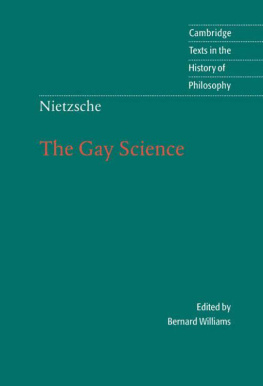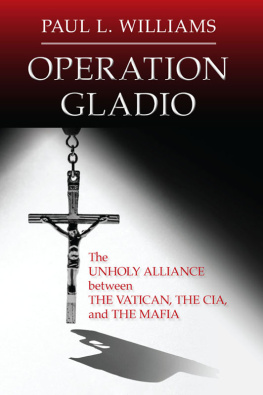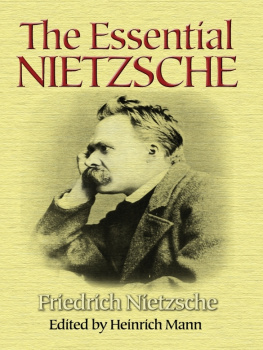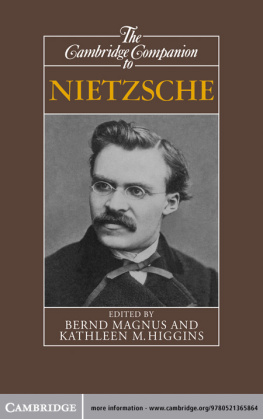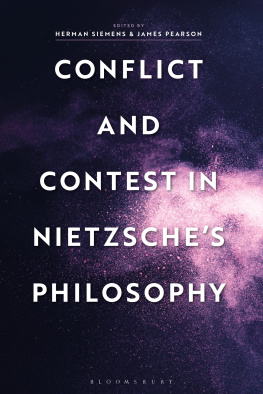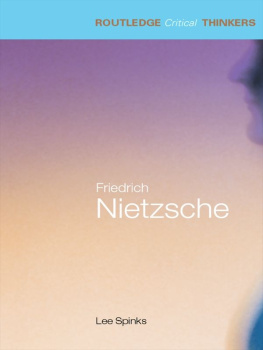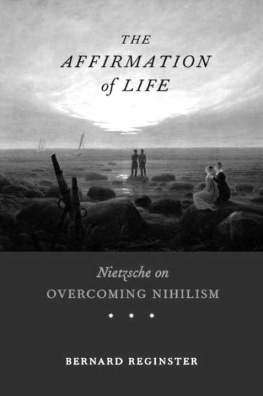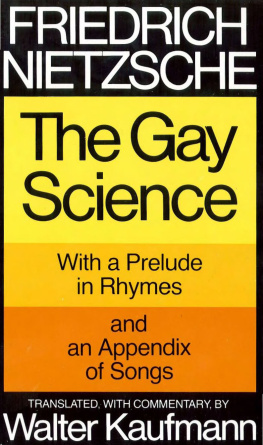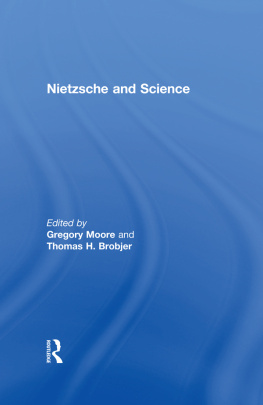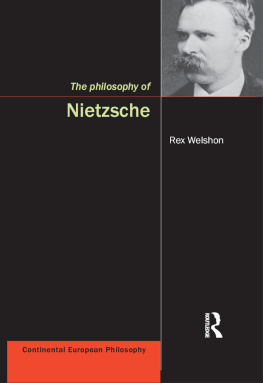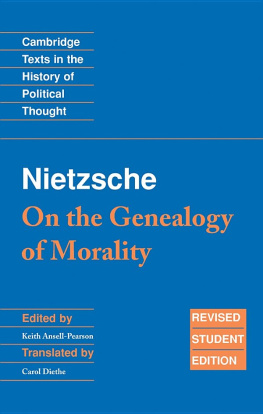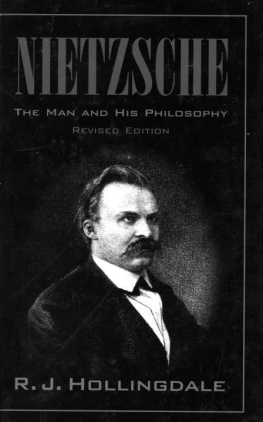CAMBRIDGE TEXTS IN THE
HISTORY OF PHILOSOPHY

FRIEDRICH NIETZSCHE
The Gay Science
CAMBRIDGE TEXTS IN THE
HISTORY OF PHILOSOPHY
Series editors
KARL AMERIKS
Professor of Philosophy at the University of Notre Dame
DESMOND M. CLARKE
Professor of Philosophy at University College Cork
The main objective of Cambridge Texts in the History of Philosophy is to expand the range, variety and quality of texts in the history of philosophy which are available in English. The series includes texts by familiar names (such as Descartes and Kant) and also by less well-known authors. Wherever possible, texts are published in complete and unabridged form, and translations are specially commissioned for the series. Each volume contains a critical introduction together with a guide to further reading and any necessary glossaries and textual apparatus. The volumes are designed for student use at undergraduate and postgraduate level and will be of interest not only to students of philosophy, but also to a wider audience of readers in the history of science, the history of theology and the history of ideas.
For a list of titles published in the series, please see end of book.
FRIEDRICH NIETZSCHE

The Gay Science
With a Prelude in German Rhymes and an Appendix of Songs
EDITED BY
BERNARD WILLIAMS
All Souls College, Oxford
TRANSLATED BY
JOSEFINE NAUCKHOFF
Wake Forest University
POEMS TRANSLATED BY
ADRIAN DEL CARO
University of Colorado at Boulder

CAMBRIDGE UNIVERSITY PRESS
Cambridge, New York, Melbourne, Madrid, Cape Town, Singapore, So Paulo, Delhi, Mexico City
Cambridge University Press
The Edinburgh Building, Cambridge CB2 8RU, UK
Published in the United States of America by Cambridge University Press, New York
www.cambridge.org
Information on this title: www.cambridge.org/9780521631594
Cambridge University Press 2001
This publication is in copyright. Subject to statutory exception and to the provisions of relevant collective licensing agreements, no reproduction of any part may take place without the written permission of Cambridge University Press.
First published 2001
12th printing 2013
Printed and bound in the United Kingdom by the MPG Books Group
A catalogue record for this publication is available from the British Library
Library of Congress cataloguing in publication data
Nietzsche, Friedrich Wilhelm, 18441900.
[Frhliche Wissenschaft. English]
The gay science: with a prelude in German rhymes and an appendix of songs / Friedrich Nietzsche;
edited by Bernard Williams; translated by Josefine Nauckhoff; poems translated by Adrian Del Caro.
p. cm. (Cambridge texts in the history of philosophy)
Includes bibliographical references (p. ) and index.
ISBN 0 521 63159 9 (hardback) ISBN 0 521 63645 0 (paperback)
I. Philosophy. I. Williams, Bernard Arthur Owen. II. Nauckhoff, Josefine.
III. Del Caro, Adrian, 1952. IV. Title. V. Series.
B3313.F72 E5 2001
193dc2I 2001025408
ISBN 978-0-521-63159-4 hardback
ISBN 978-0-521-63645-2 paperback
Cambridge University Press has no responsibility for the persistence or accuracy of URLs for external or third-party internet websites referred to in this publication, and does not guarantee that any content on such websites is, or will remain, accurate or appropriate. Information regarding prices, travel timetables and other factual information given in this work are correct at the time of first printing but Cambridge University Press does not guarantee the accuracy of such information thereafter.
Contents
Introduction
The Gay Science is a remarkable book, both in itself and as offering a way into some of Nietzsches most important ideas. The history of its publication is rather complex, and it throws some light on the development of his thought and of his methods as a writer. He published the first edition of it in 1882. In that version, it consisted of only four books, and had no Preface, though it did have the Prelude in Rhymes. A second edition appeared in 1887, which added a fifth book, the Preface, and an Appendix of further poems. This is the work as we now know it, and which is translated here.
Between the two editions of The Gay Science, Nietzsche wrote two of his best-known works, Thus Spoke Zarathustra (18835) and Beyond Good and Evil (1886); the last section of Book Four of The Gay Science (342) is indeed virtually the same as the first section of Zarathustra. So the complete Gay Science brackets these two books, which are different from it and from each other. (Zarathustra, which is a peculiar literary experiment in a rhetoric drawn from the Bible, was once one of Nietzsches most popular works, but it has worn less well than the others.) Book Five of The Gay Science anticipates, in turn, some of the themes of another famous book which was to follow in 1887, On the Genealogy of Morality, which is again different in tone, sustaining a more continuous theoretical argument.
The Gay Science is a prime example of what is often called Nietzsches aphoristic style. It consists of a sequence of sections which are not obviously tied to one another except, sometimes, in general content, and which do not offer a connected argument. The second half of Book Three, in particular, consists of many very short paragraphs of this kind. Elsewhere, however, there are longer passages, and in fact the arrangement of the shorter sections is not as fortuitous as it may look. It is often designed to gather thoughts which will, so to speak, circle in on some central theme or problem.
In his earlier works, Nietzsche had moved gradually towards this style. He had been appointed in 1869 as a professor of classical philology at the University of Basle, at the extraordinarily early age of twenty-four. He served in this position for ten years, resigning in 1879 because of the ill health which was to persist throughout his life. (The last letter he wrote, when in 1889 he broke down into insanity and a silence which lasted until his death in 1900, was to his distinguished colleague at Basle, Jacob Burckhardt, in which he said that he would rather have been a Swiss professor than God, but he had not dared to push egoism so far.) In his years at Basle he published first The Birth of Tragedy, which has the form, if not the content or the tone, of a treatise, and a set of four long essays collected as Untimely Meditations. In 18789 he brought out two books forming Human, All Too Human, followed in 1880 by a further part called The Wanderer and his Shadow, and in these writings he moved from continuous exposition and argument to setting out a sequence of thoughts which were not necessarily tied discursively to their neighbours, a style that allowed him to approach a question from many different directions. In Daybreak, which came out in 1881, the style is fully developed. As late as 25 January 1882 he still referred to what were to be the first books of The Gay Science as a continuation of Daybreak; by June they had acquired their separate title.
When he made that decision, he sensed that Book Four, which is called Sanctus Januarius and invokes the spirit of the New Year, might be found obscure, and he was anxious about whether his correspondent, Peter Gast, would understand it. He knew that this was not just a set of penetrating, perhaps rather cynical,
Next page
